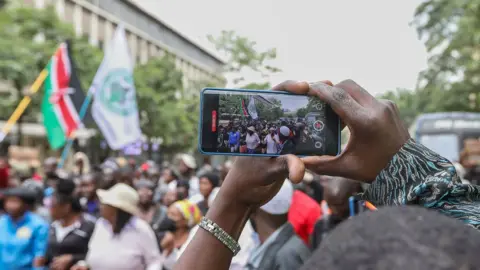The recent demonstrations led by Kenya’s Gen Z demonstrated in spectacular fashion the immense power of the internet. The impacts of the well-coordinated street action that was largely organized on social media, are still reverberating across the country. However, for all the rave reviews of this watershed moment for the country, the protests also served as a stark reminder of the gaping digital divide that still plagues our country. While young people in Kenya’s urban areas and even the diaspora engaged in stimulating debates on X spaces and other platforms, some of their rural counterparts, could not enjoy similar access to the avalanche of information at the height of protests.
Indeed, the digital divide in Kenya is sobering, with urban areas enjoying considerably better connectivity than rural regions. This disparity not only restricts access to information but also stifles opportunity in emerging digital economies. According to the Communications Authority of Kenya, urban centers boast an internet penetration rate of around 40.8%, a stark contrast to the underserved rural communities. This divide not only diminishes economic and educational opportunities but also limits access to healthcare, thereby perpetuating a cycle of exclusion. Finding solutions to the disparity must therefore be an integral part of any attempt to involve the Gen Zs and other generations in the management of the country.
Firstly, we must embark on a robust investment program in digital infrastructure to catalyze rapid economic growth. By enhancing internet access in underserved areas, we can unlock the door to e‑commerce and entrepreneurial endeavors. Emulating successful models from countries like India, where rural internet programs have significantly boosted local economies, Kenya can provide platforms such as Jumia and Kilimall the opportunity to expand, thus democratizing economic opportunities and inspiring a new generation of digital entrepreneurs.
Secondly, education must be revolutionized through digital integration. By ensuring every child has access to digital tools and learning resources, we can safeguard their future in the global economy. Successful initiatives like Estonia’s Tiigrihüpe (Tiger Leap), which integrated technology across its educational framework, demonstrate the transformative power of digital education. In Kenya, implementing similar nationwide digital literacy programs, supported by partnerships between the government and tech giants like Jamii Telcoms, could provide the next generation with the skills necessary to thrive.
Thirdly, even as we grapple with the disputed SHIF, healthcare can be significantly improved through digital initiatives. Telemedicine, inspired by models in Brazil and Thailand, can exponentially expand medical access in Kenya. In Brazil, telemedicine supports over 40,000 medical centers, primarily for teleconsultations, enhancing healthcare delivery in remote areas. Similarly, in Thailand, the Samitivej Virtual Hospital offers comprehensive telemedicine services, especially crucial in rural areas where there is only one doctor for every 2,065 people, compared to the WHO’s recommendation of one per 439.
For these transformations to occur, robust policy support is essential. The government must prioritize digital infrastructure as a fundamental utility, akin to water and electricity. Promoting private investment and fair regulatory environments is essential for achieving digital inclusivity.
Moreover, digital platforms like the new and unmatched YouShiriki created by our Gen Zs can empower all Kenyans to enhance more transparent governance services by proposing, discussing, and implementing policies for a better future.
At this pivotal moment, Kenya’s path to unmatched national development through digital inclusivity is clear. This is not merely an investment in technology but an investment in the very structure of our nation’s future. By harnessing the potential of digital technologies, we can transform our economic landscape, enhance educational systems, improve healthcare delivery, and build a more inclusive society. The demands of our youth, echoing through the streets in demonstrations, align with this vision—they are not just asking for change, they are asking for a future where everyone has the opportunity to succeed. The time to act is now- let’s make this vision a reality for every Kenyan, today and tomorrow. Think Green, Act green!



